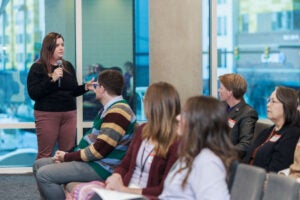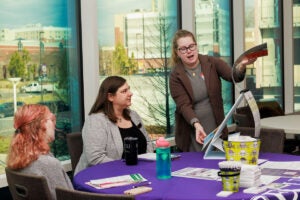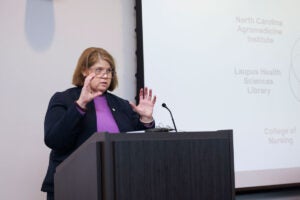ECU forum focuses on strategies, impact with state agencies

Dr. Emily Yeager with the Department of Recreation Sciences provides remarks during the ECU forum with the North Carolina Office of Strategic Partnerships. (Photos by Steven Mantilla.)
The sharing of information, ideas and strategies permeated the room in the East Carolina University Main Campus Student Center on Friday for a unique opportunity with the North Carolina Office of Strategic Partnerships.
Nearly 100 researchers, including faculty and some students, registered for the networking forum hosted by the College of Health and Human Performance. It focused on strengthening partnerships with state agencies to deliver on ECU’s mission.
Anecdotes about successful research partnerships came from various representatives of ECU’s Main Campus and Health Sciences Campus, along with a presentation and remarks by Jenni Owen, director of the N.C. Office of Strategic Partnerships.
Faculty members, representing the Pirate Leadership Academy at ECU, College of Health and Human Performance and Department of Political Science, shared about how they have experienced research support and guidance from state agencies. Dr. Emily Yeager, assistant professor in the Department of Recreation Sciences, said the impact can be multi-dimensional.
“The biggest takeaway, to me, is that there are people who can broker relationships between government agencies and faculty, to make sure that you have applied relevant research,” Yeager said. “I think that could actually translate to teaching, as well. What we bring into the classroom oftentimes as faculty is what you are researching. So when you say you are partnering with a real state agency to make real impact in the state where students are living, that is an invaluable message and experience for the students.”

Librarians discuss education and library resources prior to breakout sessions at the ECU forum with the North Carolina Office of Strategic Partnerships, hosted by the College of Health and Human Performance.
Kerry Sewell and Dr. Joseph Lee represented the College of Health and Human Performance as lead organizers. Academic Library Services, the College of Allied Health Sciences, College of Education, College of Nursing, Laupus Health Sciences Library, North Carolina Agromedicine Institute, ECU Research, Economic Development and Engagement and the Thomas Harriot College of Arts & Sciences also co-sponsored the event.
After formal presentations, there were additional, informal opportunities for networking and engaging conversations.
“I was struck, positively, not only by the array of disciplines and roles in the room, but also by the interest, knowledge and commitment to partnership between research and government,” Owen said. “The forum was excellent – I give it two enthusiastic thumbs-up. I got both specific and broad questions after the presentation, which shows people here were really thinking about what to do next and how to use this information to stimulate and act on additional engagement.”
Breakout sessions concluded the event. Tables were organized by topic area to foster focused conversations in agriculture, environmental health, public safety, education and library resources, and state agency networking.
This came three months after ECU highlighted $85.6 million in sponsored awards in fiscal year 2023, its highest level on record. That effort included 439 faculty members who conducted sponsored activities, a record $3.6 million Department of Defense funded projects and $29.7 million secured by the Brody School of Medicine as the university leader, followed by the College of Health and Human Performance at $13.6 million.

Dr. Sharon Paynter, ECU’s acting chief research and engagement officer, addresses faculty, staff and students during ECU’s research and forum event with the North Carolina Office of Strategic Partnerships.
“Partnerships with state agencies is a real strength of ECU and how we’re situated with the services and expertise we can provide, so I was thrilled to host the North Carolina Office of Strategic Partnerships,” said Lee, HHP’s associate dean for research. “It was great to see the connections of so many other ECU colleges and disciplines of work to state agencies, along with HHP’s own work.”
Dr. Sharon Paynter, ECU’s acting chief research and engagement officer, delivered the opening remarks.
“Joseph and the College of Health and Human Performance have done an amazing job in engaging this discussion today, but also in thinking about what we are doing together, strategically,” Paynter said. “The co-sponsors of this forum come from across every corner of our campus. This is also a nice demonstration of the good and broad partnership that exists within the university, just thinking about the intersectionality and how we can leverage that in innovative ways is exciting to think. The university’s resource commitment and infrastructure, along with the external partnerships that support mutually beneficial community engagement efforts, is one way ECU delivers on its promises to be a national model for student success, public service and regional transformation. Today, and in those that follow, I know you all will be focused on how state agencies and academic communities can work together to strengthen lives in North Carolina and the communities where we all work, live and play.”